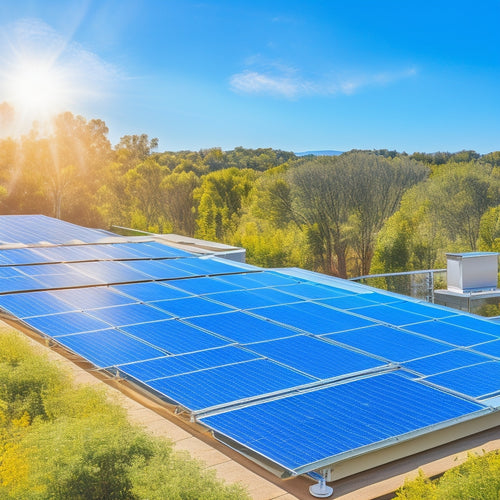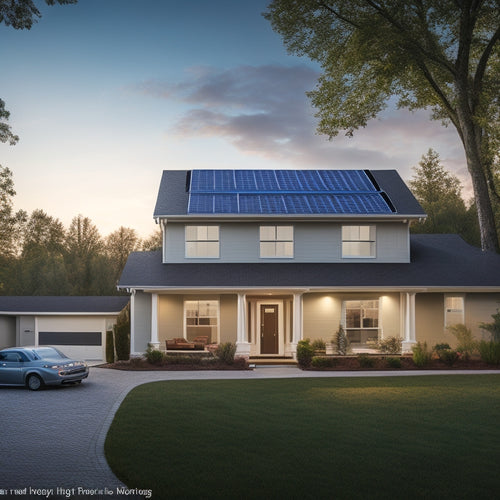
Are Integrated Solar Panels the Key to Net-Zero Energy Homes
Share
Integrated solar panels are indeed key to achieving net-zero energy homes. They considerably reduce your energy bills and increase property value while offering immediate financial relief through available incentives. With ideal designs that maximize energy output, you can capture sunlight more effectively. Aesthetic integration guarantees these panels enhance your home's appeal rather than detract from it. By selecting the right panels for your roof type, you'll further improve energy efficiency. Their seamless installation not only meets sustainability goals but raises your living environment. Uncovering their full potential might just change how you view home energy solutions.
At a Glance
- Integrated solar panels reduce energy bills and offer financial incentives, making them cost-effective for achieving net-zero energy homes.
- Optimized solar panel design enhances energy efficiency, maximizing sunlight capture and conversion rates for net-zero energy production.
- Aesthetic integration of solar panels improves home appearance, encouraging sustainable choices without compromising visual appeal.
- Proper roof type and orientation are crucial for solar panel performance, influencing energy production capabilities in net-zero homes.
- Advanced energy storage solutions ensure power availability, supporting net-zero energy homes during non-sunny periods and managing energy fluctuations.
Cost-Effective Long-Term Investment
Investing in integrated solar panels can greatly lower your energy bills, giving you immediate financial relief.
Over time, not only will you save on utility costs, but you'll also increase your property's value, making it a smart long-term investment.
Lower Energy Bills
When you choose integrated solar panels for your net-zero energy home, you're not just enhancing your property's value; you're also setting the stage for significant savings on energy bills. These systems utilize the sun's power, allowing you to produce your own electricity and reduce reliance on traditional energy sources.
With energy conservation as a core principle of net-zero living, you'll notice an extraordinary decrease in your monthly utility costs.
Moreover, many regions offer utility incentives for homeowners who invest in solar technology. These financial benefits can include rebates, tax credits, and net metering options, further lowering your initial investment and improving your return.
By taking advantage of these incentives, you can maximize your savings and make your shift to solar energy even more persuasive.
As energy prices continue to rise, locking in your energy costs with solar panels protects you from future increases. This proactive approach not only encourages financial freedom but also enables you to contribute positively to the environment.
Increased Property Value
Integrated solar panels not only improve energy efficiency but also greatly enhance your property's market value. When you invest in these systems, you're making a cost-effective long-term investment that pays off during property appraisal and resale.
As the demand for sustainable living grows, homes equipped with integrated solar panels are becoming more desirable, attracting buyers who prioritize energy efficiency and reduced carbon footprints.
With the rising market demand for eco-friendly features, your property stands out, not just in aesthetics but also in financial value. Buyers are increasingly willing to pay a premium for homes that promise lower energy costs and a sustainable lifestyle. This trend translates into higher appraisal values, which can greatly amplify your return on investment.
Furthermore, integrated solar panels often require less maintenance than traditional solar systems, adding to their appeal. By choosing this option, you're not just improving your home; you're adopting a future where energy independence is a reality.
Enhanced Energy Efficiency
To maximize the benefits of integrated solar panels, you need to focus on solar panel design efficiency and energy storage solutions.
High-efficiency panels capture more sunlight, converting it to usable energy, while advanced storage systems guarantee you have power when the sun isn't shining.
Additionally, evaluating battery types and options is essential for determining the best fit for your home's energy needs.
Solar Panel Design Efficiency
Maximizing solar panel design efficiency is essential for achieving enhanced energy efficiency in net-zero energy homes. With the rapid pace of solar technology advancements, you can tap into photovoltaic innovations that notably enhance energy output. These innovations don't just improve performance; they also enhance the aesthetic integration of solar panels into your home, allowing you to maintain your design vision while optimizing energy production.
Here's a snapshot of key factors in solar panel design efficiency:
| Design Factor | Impact on Efficiency |
|---|---|
| Cell Material | Higher energy conversion |
| Panel Orientation | Maximizes sunlight capture |
| Surface Coating | Reduces reflection losses |
| Integrated Systems | Streamlines energy use |
Energy Storage Solutions
Effective energy storage solutions are vital for enhancing the overall efficiency of net-zero energy homes. By incorporating advanced battery technology, you can store excess energy generated from integrated solar panels, ensuring you have a reliable energy supply when the sun isn't shining. This capability not only maximizes your renewable integration but also provides you with the freedom to control your energy consumption.
Modern battery systems, such as lithium-ion and emerging solid-state batteries, offer impressive energy density and longevity. With these technologies, you can effectively capture and employ renewable energy, greatly reducing your reliance on the grid. Imagine having the power to run your appliances during peak hours without incurring additional costs.
Moreover, energy storage solutions can help manage fluctuations in energy production and consumption. This balance is essential for achieving net-zero status, as it enables you to offset any shortfalls with stored energy.
Adopting these systems not only enables you to take charge of your energy usage but also contributes to a cleaner, more sustainable future. In pursuing net-zero energy homes, investing in energy storage is a pivotal step toward energy independence.
Innovative Design Integration
When you think about integrating solar panels into your home, consider how their design can enhance both aesthetics and functionality.
Innovative design strategies allow you to optimize space while creating a visually appealing structure that complements your surroundings.
Additionally, utilizing clean, quiet energy can greatly contribute to a serene living environment, similar to the ambiance achieved while camping.
Aesthetic Appeal Enhancements
In the domain of sustainable design, integrating solar panels into your home's layout can greatly enhance its aesthetic appeal. You no longer have to settle for bulky, unattractive panels; modern innovations allow for sleek, integrated designs that complement your home's design.
With color customization options, you can select shades that harmonize with your exterior, making solar panels an attractive feature rather than an eyesore.
Additionally, the rise of minimalist design trends means you can achieve a clean and modern look without sacrificing style for sustainability.
These trends emphasize simplicity and functionality, and when solar panels are seamlessly integrated into your roofline, they enhance the overall design while contributing to your home's energy efficiency.
Space Utilization Strategies
Integrating solar panels into your home's design not only enhances aesthetics but also opens up new possibilities for space utilization. By employing innovative strategies, you can alter your living environment into a multifunctional space that promotes outdoor living and sustainability.
Imagine rooftop gardens that not only produce food through urban farming but also serve as green roofs, providing insulation and solar shading.
Passive design principles can help you optimize space while maximizing natural light and ventilation. Incorporating vertical gardening into your walls can enhance biophilic design, nurturing a connection to nature and improving air quality.
These elements not only beautify your home but also contribute to energy efficiency and environmental responsibility.
Space optimization is key in modern design. When you integrate solar panels, you're not just utilizing renewable energy; you're rethinking how your space works for you.
Whether it's creating shaded outdoor areas for relaxation or growing fresh produce in limited square footage, the potential is immense. Adopt these strategies, and you'll find that your home can be both a sanctuary of freedom and a model of sustainable living.
Selecting Based on Roof Type
When selecting solar panels, it's vital to evaluate your roof type, as different materials can affect installation and efficiency.
The orientation, shading, and angle of your roof play a significant role in determining the best placement for your solar array, which directly impacts energy production.
By understanding these factors, you can make a more informed decision that enhances your home's net-zero energy potential, ensuring you get the most out of your investment in solar technology.
Additionally, reviewing your home's solar potential assessment will help identify the best configuration for your system.
Roof Material Compatibility
Choosing the right roof material is essential for optimizing the performance of integrated solar panels in net-zero energy homes. Different roof types, such as asphalt shingles, metal, and tile, each present unique advantages and challenges.
For instance, asphalt shingles are lightweight and can support various installation techniques, making them a popular choice for homeowners. However, if you opt for metal roofing, you'll benefit from its durability and reflective properties, which can enhance solar panel efficiency.
When considering tile roofs, it's imperative to guarantee compatibility with integrated solar panel systems, as their weight may require additional structural support. Additionally, the cost of installation techniques may vary based on the roof type, impacting your overall budget.
You want to maximize your investment in solar technology, so understanding these compatibility factors is essential. Selecting the right roof material not only improves solar panel performance but also contributes to the longevity of your home.
Make an informed choice, and you'll be one step closer to achieving the freedom of a net-zero energy lifestyle. Accept the challenge and enjoy the benefits of sustainable living!
Orientation and Angle Considerations
After choosing the right roof material, the next step involves understanding how orientation and angle impact the performance of integrated solar panels.
Your roof's orientation should ideally face true south, maximizing exposure to the sun's path throughout the day. This positioning captures more sunlight, which translates to higher energy production.
Consider the angle of your roof too; a tilt of around 30 to 45 degrees is generally best for solar efficiency. This angle allows panels to absorb sunlight more effectively, especially during peak hours.
However, depending on your geographical location, you might need to make seasonal adjustments. For instance, in winter, a steeper angle could capture more sunlight when the sun is lower in the sky.
If your roof type limits these ideal conditions, don't fret—there are innovative solutions available. By understanding these factors, you can maximize your integrated solar panels' performance, ultimately leading you closer to achieving net-zero energy in your home.
The freedom to utilize solar power efficiently starts with knowledge about orientation and angle considerations. Make informed decisions that enhance your energy independence.
Aesthetic Appeal and Seamlessness
When considering integrated solar panels, you'll appreciate how modern building designs seamlessly incorporate these systems into your home.
This integration enhances your property's aesthetic appeal without compromising its style.
Modern Architectural Integration
How can integrated solar panels enhance the aesthetic appeal of modern homes? By blending seamlessly into your home's design, these panels alter what was once seen as an eyesore into a refined feature of sustainable design. You can opt for sleek, minimalist styles that complement your home's lines while promoting eco-friendly materials that align with your values.
With the rise of modern architectural trends, integrated solar panels are no longer just functional; they can be works of art. Imagine a roof that not only generates power but also enhances the overall look of your home. This kind of design freedom allows you to express your individuality while committing to energy efficiency.
Incorporating integrated solar panels means you're making a statement—one that says you care about both aesthetics and the environment. It's about choosing materials that reflect your commitment to a sustainable future.
Frequently Asked Questions
How Do Integrated Solar Panels Compare to Traditional Solar Panels in Efficiency?
When you compare integrated solar panels to traditional ones, you'll find they often offer better aesthetic appeal and a streamlined installation process. Their efficiency can enhance your energy independence, giving you greater freedom in energy choices.
Are There Maintenance Requirements Specific to Integrated Solar Panels?
As you bask in sunlight filtering through solar panels, remember they require minimal upkeep. During the installation process, consider cost considerations for maintenance; regular checks guarantee peak performance, letting you enjoy energy independence effortlessly.
Can Integrated Solar Panels Power My Entire Home?
Integrated solar panels can power your entire home effectively, providing significant cost savings over time. The installation process is streamlined, allowing you to adopt energy independence while reducing reliance on traditional energy sources for freedom and sustainability.
What Warranties Are Typically Offered for Integrated Solar Panels?
They say a good investment lasts. Most integrated solar panels come with warranties ranging from 20 to 25 years, covering installation and performance. This security guarantees you'll enjoy sustainable energy without unexpected costs for years.
How Do Weather Conditions Affect the Performance of Integrated Solar Panels?
Weather conditions greatly impact integrated solar panels' performance. Factors like temperature, cloud cover, and precipitation create performance variables that can reduce energy output. Understanding these weather effects is essential for optimizing your solar energy system's efficiency.
Explore More
In the quest for net-zero energy homes, you might think integrated solar panels are just a trendy accessory. Ironically, they're the unsung heroes of energy efficiency, silently converting rooftops into powerhouses while enhancing your home's aesthetic. By choosing the right design for your roof type, you're not just investing in your home's future; you're embracing a sustainable lifestyle. So, while others chase fleeting fads, you'll be basking in the glow of a cost-effective, eco-friendly investment that truly pays off.
Related Posts
-

What Types of Solar Energy Devices Are Available
You'll find several types of solar energy devices available today, each customized to different energy needs. Photovo...
-

Cost of Solar With Battery Backup
You're investing in a solar panel system with battery backup to guarantee reliable power during outages. The cost of ...
-

Smart Grid Technology Implementation Challenges
You'll encounter several challenges when implementing smart grid technology, particularly in cost management, scalabi...


